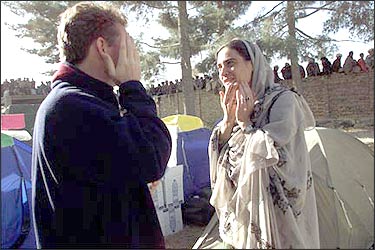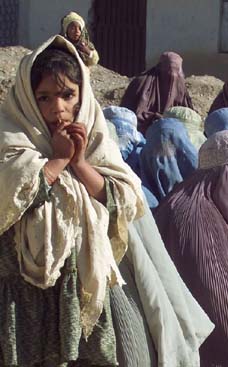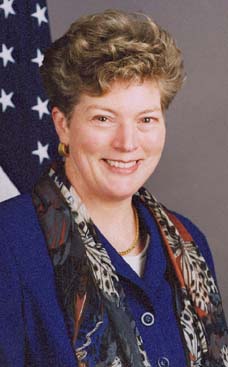
I think that sometimes there is an excessive reliance on bombing in a campaign that really has to be much closer to the people. Unfortunately, in a real "counter- insurgency," in which Canadian troops would be out on foot patrols, really responding to the people's need for protection, more Canadians would die. A political decision has been made to protect Canadian soldiers' lives at the expense of civilians who are accidentally killed or their property damaged in bombings, etc. This decision unfortunately has increased the number of Afghans with an axe to grind with the Afghan government and its international backers. On the other hand, combat operations are very much needed. Right now, as I am writing to you, the administrative center of a district just north of here is beseiged by the Taliban. Canadian forces are too thin to provide the assistance the Afghan army and police need to defend against such attacks. Don't forget: The Taliban are organized, trained, commanded and financed across the border in Pakistan, by the Pakistani military. They are not, at root, home-grown. Morocco RPCV Sarah Chayes has made a home in Kandahar, Afghanistan, became fluent in Pashto, one of the main Afghan languages, and devoted her energies to rebuilding a country gutted by two decades of war.
An Interview with Sarah Chayes
The perils of delivering aid in Afghanistan
Sarah Chayes took your questions from Kandahar
Globe and Mail Update
August 15, 2008 at 12:00 PM EDT
"The gunning down of three female foreign aid workers -- two of them Canadians -- and their Afghan driver a few dozen miles south of Kabul on Wednesday is the latest bloody murder to underscore the relentless deterioration in Afghan security conditions," Sarah Chayes wrote in today's Globe in her Comment Page article The perils of delivering aid
"Here in beleaguered Kandahar -- where I have lived for nearly seven years and currently run a small soap-making co-operative -- what most distressed my co-op members was the gender of the victims.
"Women?" Nurallah pronounced, aghast. "They're killing women? These people can't be Afghans. If my worst enemy -- my own personal enemy -- came into my hands, but his wife was present, I wouldn't touch him. I would let him go."
Ms. Chayes continues: "On that point, Canadians and Afghans can agree.
American activist Sarah Chayes has launched a cooperative in Kandahar to make soaps and oils from pomegranates and other local plants.
"Western coverage has brought to light other areas, however, where Afghan and international perceptions of this tragedy diverge . . . "
"This conflict, however, is different [from most countries where international aid agences operate.]
"Neither the forces fighting the Afghan government, nor ordinary people, make any distinction between international humanitarian workers, the Afghan government, and international military forces. All are seen as part of the same system.
"The vast majority of regular folk desire the presence of these interlocking groups . . . [but] anti-government forces are just as hostile to aid workers as they are to soldiers or government officials. The only place as dangerous to be as a NATO military convoy is a clearly marked humanitarian vehicle . . .
"But the most important constraint on aid work is the risk it poses to Afghans. Many villages in Kandahar have been refusing development assistance for several years now. They are afraid that the mere acceptance of these projects will transform their homes into targets . . .
"The Afghans do not support this so-called insurgency. They are its primary targets," Ms. Chayes concludes.
globeandmail.com is pleased that Ms. Chayes was online earlier today to take your questions on her column and on the situation on the ground in Afghanistan.
Your questions and Ms. Chayes's answers appear at the bottom of this page.
Sarah Chayes is the founder of Arghand, a soap-making co-operative in Kandahar. She is also the author of "The Punishment of Virtue: Inside Afghanistan After the Taliban".
Jim Sheppard, Executive Editor, globeandmail.com: Welcome, Ms. Chayes, and thanks for joining us today to take questions from the readers of globeandmail.com Before we get to questions about your column in today's Globe, I wonder if you could tell us a bit more about why you have chosen to live in Kandahar for the past seven years and about your soap-making cooperative?
Sarah Chayes: I came to Kandahar first as a reporter, working for National Public Radio. I decided to stay, because I felt -- and still feel -- that what happens in Afghanistan is key to how the 21st Century is going to look.
I think there are some people -- both in the West and in the Muslim community -- who would like to see the world split apart, into irrevocably hostile blocs. Those people are objective allies. I don't want to live in that kind of world.
I think the world is an interconnected place, full of distinct cultures that have their own histories, qualities, failings, and much to learn from and to teach each other. I want to live in an interconnected world, and I feel that the best place I can contribute towards that world is here in Kandahar.
I could write for hours about Arghand, my cooperative. But succinctly, what we do is purchase licit local agricultural products, such as almonds, apricot kernels, wild pistachios, cumin, anise seed, licorice root, madder and alkanet root, rose blossoms, etc., and extract seed and essential oils, colors from the dye roots, and make very high quality soaps and body oils from them.
Our products are for sale in retail shops across Canada and the United States.
We are a counter-narcotics initiative, in that we expand the market for licit local agriculture. There are 14 of us here in Kandahar. We include men and women, who work in separate spaces, but in complete mutual respect and trust. I have tried to foster a very democratic work environment, so basically no decision gets made without general consultation and consensus.
It has been a tremendous joy to watch this fledgling operation start to spread its wings, especially over the past year.
I'd like to add that the Canadian aid agency CIDA has generously funded a solar power generator which is about to ship out of Victoria, B.C., as well as supporting the salaries of two international members (myself included) and our most highly-qualified Afghan.
For more information on Arghand, and where you can purchase our products, please consult www.arghand.org
Richard E. Gower, Ottawa: Ms. Chayes, this is a well-written and balanced article from someone without a political axe to grind, who has been in Afghanistan for seven years.
From these testimonials alone, it seems clear that what Canada is doing there has significant worth.
Military deaths and atrocities like what happened to the aid workers are always tragic, but should Canada abandon the mission? If we were taking a poll on it, I'd vote no. Stay the course.
At some point, vicious criminal acts like this will be seen by all there as the barbarism that they are and general order will be restored to the country.
Do you agree?
Sarah Chayes: I strongly agree. While I believe that Canadian policy could benefit from some adjustments -- both on the civilian and the military side -- it is clear to me and to the Afghans I live amongst that Canada has done tremendous work here, and that withdrawal would spell disaster -- for the Afghans.
John Chartrand, Shediac, N.B.: It's sad to say but this is how it goes: People lose their lives in lawless states.
Think for a moment about how an Afghan must feel as they live with such terror every minute of every day -- and the best our opposition parties can offer is withdraw the troops and negotiate.
Can you comment?
Sarah Chayes: It was very important to me to bring to light some of what ordinary Afghans are suffering.
Just today, I have heard half a dozen more stories. "That's how it goes" seems a bit of a heartless response, but I do agree that we must begin to accurately assess the severity of the conditions here, especially to Afghans.
It was also very important to me to communicate that what we are experiencing here is not an insurgency in the classic sense. That is, it is not a spontaneous, local uprising.
Those who favor Canadian withdrawal often seem to think that Canadians are the primary targets and that the Afghan population supports the Taliban attacks on Canadians. That's not the case.
Afghans are the primary targets, and they do not, in their vast majority, support the militants.
At most, what I experience here is such frustration with the government we have ushered into power, and are not disciplining, that some people will turn a blind eye to the Taliban as a kind of protest vote, or more often, out of fear and intimidation.
Northern Dancer, Outside Toronto: What is the argument for delivering aid in a hostile environment at great personal risk to the aid workers. How do aid agencies even properly characterize the risk?
Sarah Chayes: I have never worked in a standard aid agency, so I actually don't know how they describe the risk.
Tom Paine: I believe we should stop all foreign aid now. Thousands of Canadians do not have safe water. Thousands of Canadians die every year from dirty hospitals. Thousands of Canadians defer, forego, or receive substandard education.
Canadian taxes should benefit Canadians first. What do you think of that?
Sarah Chayes: I think that we live in an interconnected world. I think that Canadian riches derive in part from the labour of people in lands less fortunate.
I think there is no reason to choose between safe water in Canada and development assistance to crucial places like Afghanistan. It's about properly managing and allocating resources that are quite plentiful.
Jasmine Francis, Halifax: Sarah, the work you are doing for such a troubled region must be very rewarding. I can't tell you how moved I am by your experiences.
Where can I buy your products? And if you don't know the answer to that, especially for a small province like Nova Scotia, is there any other way I can contribute to what you are doing?
Sarah Chayes: Hi Jasmine, and thanks!
If you go onto our website, www.arghand.org you will see a button marked "retailers." That shows a list of our retailers in Canada as well as the U.S. Even if there isn't one in your province, most will work mail orders.
We are not yet big enough to be able to handle direct Web sales.
John Robertson, Victoria, B.C.: You wrote in your article about how the Taliban threaten Afghans who simply receive foreign aid.
How do you personally help to protect the Afghans who work for your cooperative?
Sarah Chayes: A few ways.
We bought a vehicle that is very unobtrusive in which we drive our women cooperative members home after work every day. This is a kind of vehicle that women would normally be seen driving in, so it does not attract attention.
For those cooperative members who live in outlying districts and whose lives are now threatened, I have been providing financial assistance for them to purchase or rent houses in town. So far, two have had to move, and two more are looking.
It is heartrending, especially for those who have orchards or, for example, cumin plantations that they can no longer visit and have to leave with sharecroppers.
Jim Sheppard: To our readers, L.B. of Victoria asked a series of questions to Ms. Chayes. She is answering them separately.
L.B., Victoria, B.C.: L.B., Victoria, B.C.: Thank you, Sarah, for your close perspective.
Do you think the coalition combat offensives, aerial bombings and the resulting increase in refugees is affecting the escalation of violence in Afghanistan?
Sarah Chayes: I think that sometimes there is an excessive reliance on bombing in a campaign that really has to be much closer to the people.
Unfortunately, in a real "counter- insurgency," in which Canadian troops would be out on foot patrols, really responding to the people's need for protection, more Canadians would die.
A political decision has been made to protect Canadian soldiers' lives at the expense of civilians who are accidentally killed or their property damaged in bombings, etc. This decision unfortunately has increased the number of Afghans with an axe to grind with the Afghan government and its international backers.
On the other hand, combat operations are very much needed. Right now, as I am writing to you, the administrative center of a district just north of here is beseiged by the Taliban. Canadian forces are too thin to provide the assistance the Afghan army and police need to defend against such attacks.
Don't forget: The Taliban are organized, trained, commanded and financed across the border in Pakistan, by the Pakistani military. They are not, at root, home-grown.
L.B., Victoria: If the aid workers recently killed were working with all Afghans -- including the families and children of the Taliban/resistance, and without relying on armed force security for themselves, do you think the resulting peer influence would be an effective way to moderate and redirect extremists, as it has in the histories of all evolving democracies?
Sarah Chayes: Absolutely not. Aid workers make no distinctions among the people to whom they minister.
I don't know a single aid worker who refuses to provide assistance to Taliban-dominated villages. And in this case, as I wrote, the Taliban have painted a bull's eye on everyone who has anything to do with NGOs, the Afghan government, or the international military.
I was just speaking to an Afghan friend who works as a local adviser to the DFAIT representative here. His own parents no longer want him to visit their home, because they are so afraid.
L.B., Victoria: If so, is it not logical to conclude that these kinds of deaths [from bombing raids] were not in vain and therefore must be acknowledged and supported in the way we are now asked to support our armed force deaths?
Is it possible that it is not your reliance on armed force security but rather the inclusion and resulting autonomy of all Afghans that is making your work, and that of Rory Stewart of the Turquoise Mountain Foundation and Drew Gilmour of Development Works successful and secure?
Sarah Chayes: I had dinner recently with Drew Gilmore. He lives in an enormous, heavily guarded compound. I live in a small house with no guards, and drive a private car, although I would not drive that car outside Kandahar City any more.
You are making the same mistake that I wrote about in my article. All of us are targets, no matter how we live. The Taliban are making zero distinction between me and a U.S. soldier.
L.B., Victoria: What do you think of expanding the hosting in Canada of counterparts from all aspects of Afghan civil society (i.e. governance, judicial, medicine, education, the arts, soap manufacturers, etc) to observe and train in our systems, for them to determine what they can apply/adapt in their country?
Sarah Chayes: I would rather that the mentoring effort take place here in Afghanistan, and over a long period of time.
I say this based on my experience mentoring my cooperative members. Only after living at Arghand almost non-stop for three full years do I feel fully confident that my cooperative members can run this show on their own, and maintain the kind of standards that are necessary.
This is not because they are lazy or stupid. This is because they are the products of a society that has literally been deconstructed, in every aspect, by 30 years of conflict.
Repairing that damage -- to human behavior and to institutions -- cannot be done via a couple of months' training in an entirely different environment.
Sally Armstrong, Regina: What special problems do you face as a woman, and as a western woman, in your work in Kandahar? It must be extremely difficult -- and dangerous.
Sarah Chayes: Actually, I find that the person you want to be in Afghanistan is a Western woman.
As a Westerner, I don't quite count as female to Afghan males, and so I can interact with them as a male. I have friendships and political arguments with men ranging from village pomegranate cultivators to the Governor of Kandahar.
I just sat for nearly three hours with a council of elders in the province of Ghazni, and felt entirely at home, and was treated as a member of the group.
On the other hand, as a female, I can interact with women to a degree that Afghan men cannot in any way. They can only interact with women in their immediate nuclear family and cousins.
I am in danger, for all the reasons I wrote about, but no more so than my Afghan colleagues, and certainly no more so due to the fact that I am female. If anything, being female is a slight protection.
Jasmine Francis, Halifax: Thanks for your answer to my first question. May I ask a second?
Is there a way to donate directly to your work, as well as to purchase your cooperative's products?
Sarah Chayes: Bless you, Jasmine. There are a couple of ways to donate.
You can send us a check or donate online via paypal. The only problem there is that we are not incorporated as a non-profit in Canada, only in the United States. So you couldn't deduct your donation from your taxes, unless you have U.S. income.
The other way to help directly is to take a look at our wish list. We try to keep an updated list of things we need. So you could purchase some of those things, and send them to us at the following address:
Sarah c/o Gen. Thompson
PO Box 5058, Stn. Forces
Belleville, Ont.
Canada
K8N 5W6
That will get to us in Kandahar.
Off the top of my head, we need high-quality packing tape, and we need a . . . paper shredder. Not because we truck in classified documents, but because we find shredded paper to be one of the best packing materials for keeping our somewhat delicate soaps looking their best on the rough ride across the globe.
Jim Sheppard: Ms. Chayes, thanks again for taking the time to talk today to the readers of globeandmail.com.
Yours is an inspiring story and I'm sure our readers appreciated your on-ground insight and analysis. Any last thoughts?
Sarah Chayes: We in the West tend to react strongly and swiftly to events in other parts of the world, and then turn our attention elsewhere. Afghanistan has suffered from this short attention span in the past -- to the detriment not just of the United States on Sept. 11, 2001, but to the detriment of Muslims and non-Muslims the world over.
I have lived in Kandahar for nearly seven years. I would say that I have only started getting a handle on this place, so that I think the efforts I invested were really doing some good, after about 2˝ years.
That is approximately how long Canada as a whole has been lead nation in Kandahar. Canada is only now in a position -- drawing upon its collective experience -- to begin doing good.
I strongly urge Canadians to continue supporting their country's crucial involvement in Afghanistan.













